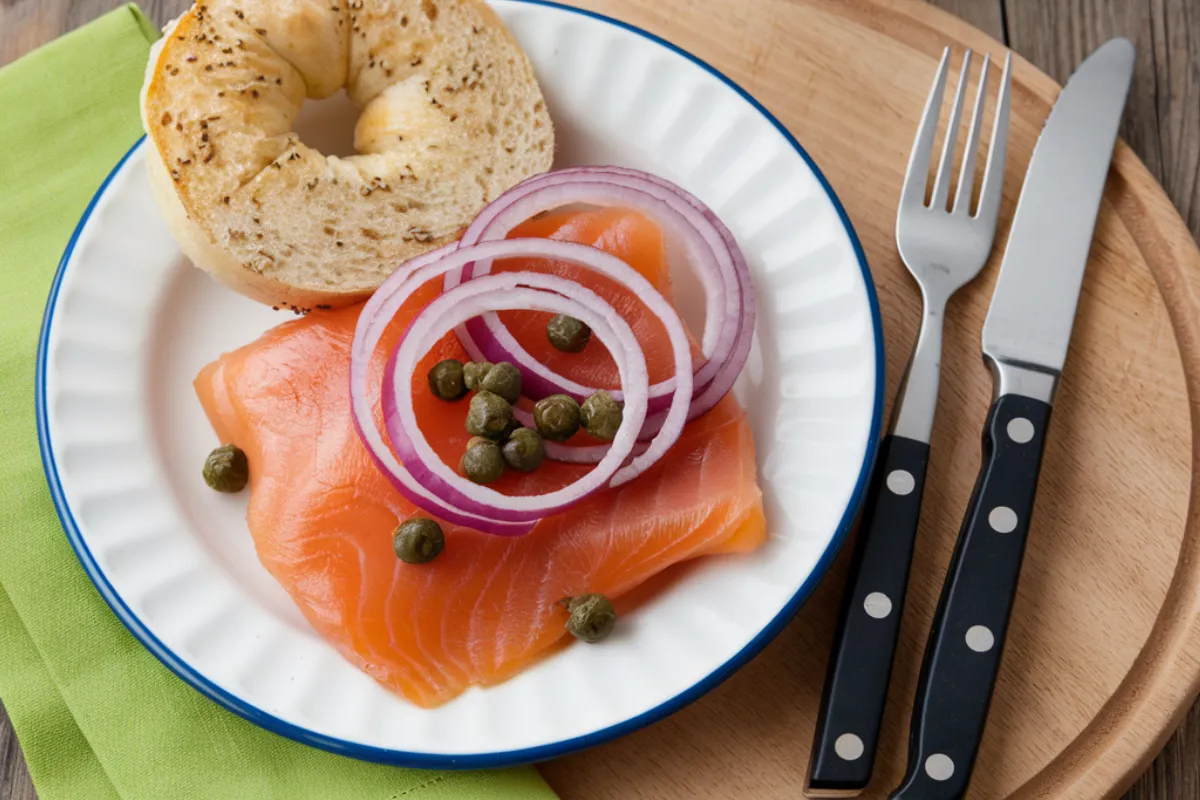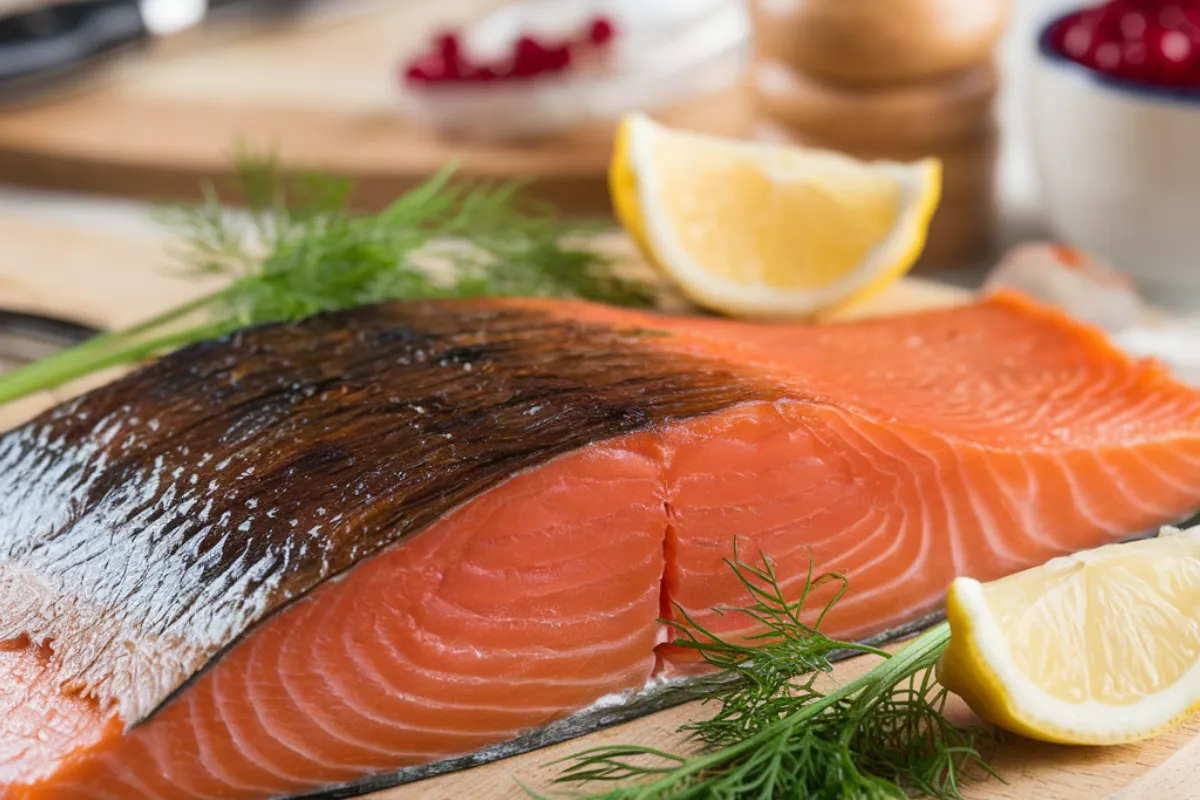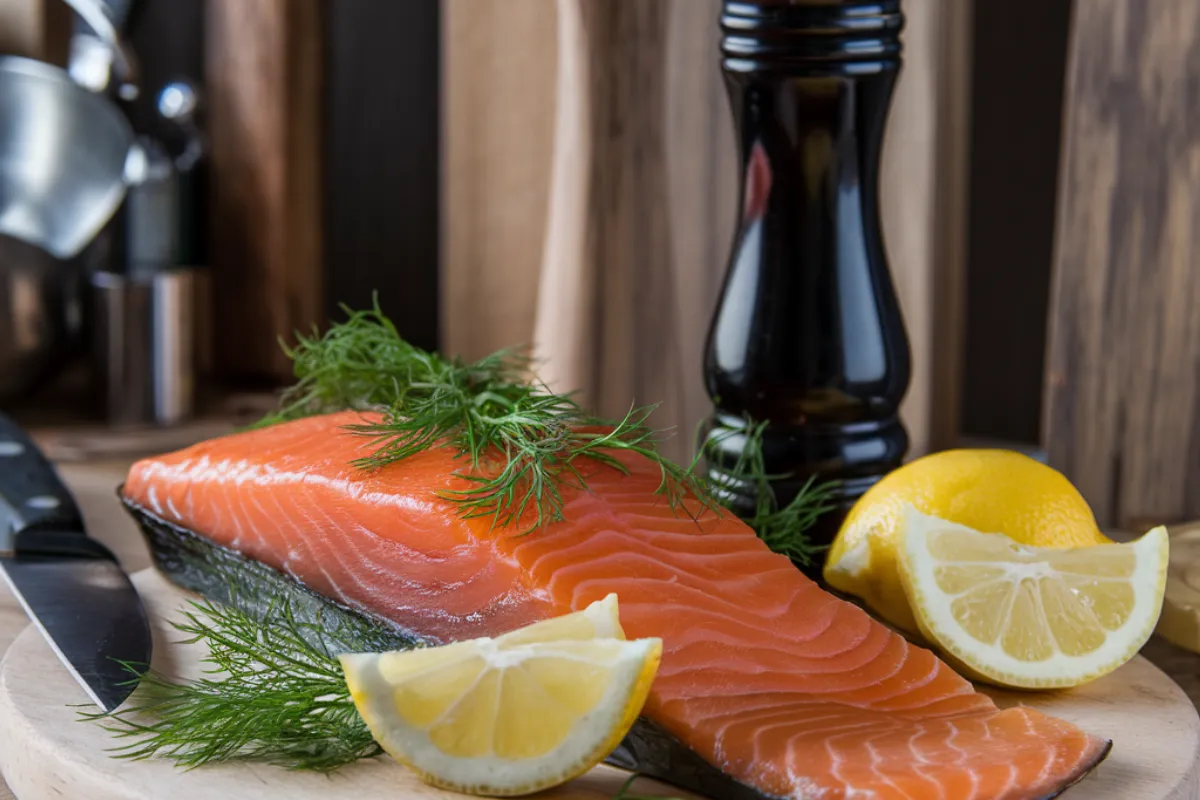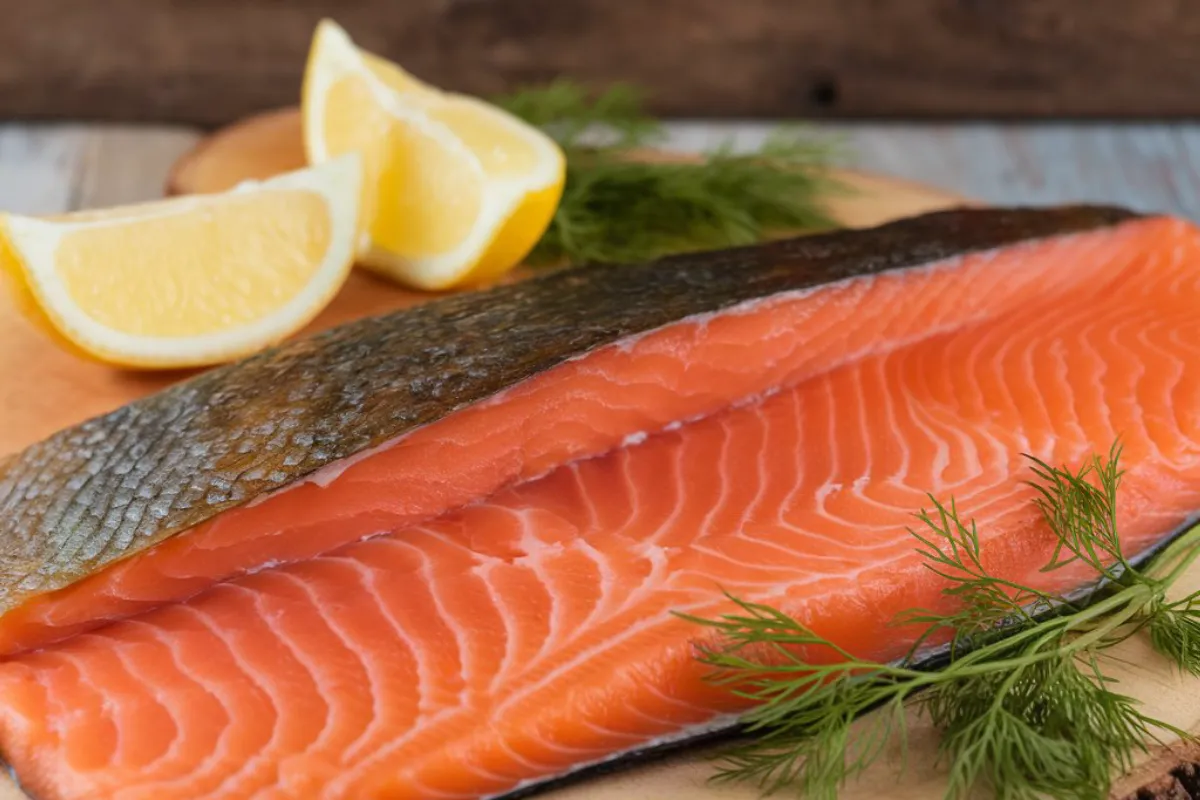
Smoked salmon is a well-loved food that is often enjoyed in appetizers, breakfast dishes, and gourmet recipes. Beyond its delicious flavor, smoked salmon provides a variety of nutritional benefits, making it a great addition to a balanced diet. In this article, we will discuss what smoked salmon is good for, including its health benefits, nutritional value, and how to add it to your meals. Smoked salmon is not only tasty but also versatile, and adding it to your diet can offer many benefits for both health and well-being. Whether you are a food enthusiast or someone wanting to improve your nutrition, smoked salmon is a great option to consider.
What Is Smoked Salmon?
Smoked salmon is made by curing salmon with salt and then smoking it using either hot smoking or cold smoking methods. This process gives smoked salmon its unique, smoky flavor and soft texture. In the past, smoking fish was a way to preserve it, and while today we no longer need smoking for preservation, it is still popular because of the distinctive taste it gives. The practice of smoking fish goes back hundreds of years and was originally developed to prevent spoilage. Over time, it became an art form, with different cultures creating their own unique methods and flavors for smoked salmon.
There are two main types of smoked salmon:
- Cold-smoked salmon: Cured with salt and smoked at a low temperature, resulting in a smooth texture similar to raw salmon. This type of smoked salmon has a mild flavor and is often used in dishes where a light, tender texture is desired.
- Hot-smoked salmon: Smoked at higher temperatures, giving it a flaky texture and richer flavor. Hot-smoked salmon has a stronger taste and is often used in recipes that need a firmer texture, such as pasta dishes or salads.
For more on the different methods of smoking salmon and their effects on nutritional quality, you can explore details on sustainable practices and types of smoked salmon. Knowing the differences between these two methods can help you choose the right type of smoked salmon for your cooking needs.
Nutritional Value of Smoked Salmon

Smoked salmon is known for its rich nutrient content. It is particularly valued for its high levels of omega-3 fatty acids, which offer many health benefits, such as supporting heart health, reducing inflammation, and improving brain function. Additionally, smoked salmon is a great source of lean protein, making it an ideal food for those wanting to maintain muscle mass while enjoying a low-calorie, nutrient-packed meal. Adding smoked salmon to your diet is an easy way to make sure you get the nutrients needed for overall health.
Key nutrients found in smoked salmon include:
- Protein: About 18 grams per 100 grams of smoked salmon. Protein is important for building and repairing tissues, supporting immune health, and keeping muscle mass, especially as we age.
- Omega-3 fatty acids (EPA and DHA): Essential for brain, heart, and eye health. Omega-3s are linked to reduced heart risks and can greatly improve overall health. These fats help lower inflammation and may reduce the risk of long-term health issues like heart disease and arthritis.
- Vitamin D: Needed for bone health and immune function. Vitamin D helps the body absorb calcium, promoting strong bones and teeth. It also helps regulate the immune system and may lower the risk of some autoimmune issues.
- B Vitamins: Including B6, B12, niacin, and riboflavin, which help with energy production and support the nervous system. B vitamins are key for converting food into energy and keeping the brain healthy.
- Minerals: Selenium, magnesium, and potassium, which are essential for metabolic and cellular health. Selenium, in particular, is a strong antioxidant that protects cells from damage, while potassium helps regulate blood pressure.
Health Benefits of Smoked Salmon
Adding smoked salmon to your diet provides many health benefits. Here are some of the main advantages:
1. Rich in Omega-3 Fatty Acids
Smoked salmon is loaded with omega-3 fatty acids, particularly eicosapentaenoic acid (EPA) and docosahexaenoic acid (DHA). These essential fats support brain health, reduce inflammation, and promote heart health. Studies show that diets rich in omega-3s can help lower the risk of heart disease and improve brain function as we age. Omega-3s are also known to help eye health and may lower the risk of age-related eye problems.
2. Great Source of Protein
Smoked salmon contains around 18 grams of high-quality protein per 100 grams, making it a great food for building and keeping muscle. This is especially important for those who exercise regularly or want to keep muscle mass as they get older. Protein is also important for keeping skin, hair, and nails healthy, and it helps with hormone production.
3. Supports Brain Health
The omega-3 fatty acids found in smoked salmon are essential for brain health and have been linked to lower risks of age-related memory loss and Alzheimer’s disease. Additionally, astaxanthin, a type of antioxidant in salmon, may protect the brain from stress caused by oxidation. Astaxanthin has been shown to have protective effects, which may help improve memory and brain function.
4. Provides Essential Nutrients
Besides omega-3s and protein, smoked salmon is rich in important vitamins and minerals:
- Vitamin D: Important for bone health and immune system function. Having enough vitamin D can lower the risk of bone loss and fractures.
- B Vitamins: Including B12, which is important for red blood cell production and nerve health. Vitamin B12 also helps prevent anemia and supports heart health by reducing homocysteine levels in the blood.
- Selenium: Acts as an antioxidant and protects cells from damage. Selenium also plays a role in thyroid health, which helps control metabolism.
5. May Help in Weight Management
Smoked salmon can be a great part of a weight management plan due to its protein content, which helps increase fullness and reduce overall calorie intake. Protein-rich foods can help you feel full for longer, which can prevent overeating throughout the day. Also, the omega-3 fatty acids in smoked salmon may boost metabolism and support fat loss by helping the body burn more calories.
Potential Drawbacks of Smoked Salmon

While smoked salmon has many benefits, there are some things to be aware of:
- High Sodium Content: Smoked salmon contains high levels of sodium due to the salting process used for preservation. A 100-gram serving may contain up to 700-800 mg of sodium, which can be concerning for those sensitive to salt or managing high blood pressure. High sodium intake can increase blood pressure and may lead to a higher risk of heart disease over time.
- Risk of Listeria: Cold-smoked salmon has a higher risk of containing listeria bacteria, which can be dangerous for pregnant women, elderly people, and those with weakened immune systems. It’s important to follow proper storage and handling to lower this risk. Listeria can cause serious illness, and pregnant women are especially at risk of complications, including miscarriage.
For more on listeria risk and safe handling practices, you can refer to the guidelines from the Centers for Disease Control and Prevention (CDC). Proper storage and cooking can greatly reduce the risk of contamination.
Who Should Eat Smoked Salmon?
Smoked salmon can be beneficial for many people, but it’s important to consider its sodium content. It is especially helpful for:
- People looking to improve heart health: Due to the omega-3 content, smoked salmon can help lower triglyceride levels and reduce inflammation, which are both important for heart health.
- Athletes and active individuals: Who need high-quality protein for muscle repair and recovery. The protein in smoked salmon helps support muscle growth and recovery, making it an excellent choice after exercise.
- Older adults: Looking to keep their brain health and muscle mass. The omega-3s in smoked salmon may lower the risk of memory loss, while the protein helps keep muscle, which is key for staying mobile and independent as we age.
However, people with high blood pressure, sodium sensitivities, or pregnant women should be cautious due to the risk of listeria. If you fall into one of these groups, it is best to talk with a healthcare provider before adding smoked salmon to your diet.
How to Include Smoked Salmon in Your Diet

There are many tasty ways to enjoy smoked salmon. Here are some ideas to help you add it to your meals:
- Breakfast: Add smoked salmon to your morning bagel with cream cheese, red onion, and capers for a classic combo. You can also include it in scrambled eggs or an omelette for a protein-rich breakfast.
- Salads: Top a fresh green salad with smoked salmon, avocado, and a light vinaigrette. The healthy fats from the avocado and omega-3s from the salmon make this a nutritious and satisfying meal.
- Pasta Dishes: Mix smoked salmon into a creamy pasta with fresh herbs and lemon zest for extra flavor. The richness of the salmon goes well with a light cream sauce, making it a comforting dish.
- Appetizers: Use smoked salmon to make small canapés, paired with cream cheese and dill on crackers or cucumber slices. These bite-sized treats are perfect for gatherings or as a light snack.
- Wraps and Sandwiches: Use smoked salmon as a filling for wraps or sandwiches, combined with fresh vegetables, cream cheese, and herbs for a tasty and easy meal option.
Tips for Buying Smoked Salmon
When buying smoked salmon, it’s important to focus on the quality and source. Here are some tips:
- Look for Wild-Caught Salmon: Wild-caught salmon usually has more nutrients and is often considered more sustainable compared to farmed salmon. Wild salmon also has a more natural diet, which adds to its rich omega-3 content and unique flavor.
- Check for Certifications: Look for products with certifications, such as MSC (Marine Stewardship Council), which show sustainable fishing practices. These certifications help make sure the salmon is sourced responsibly, protecting marine life.
- Inspect Packaging: Ensure the packaging is airtight and check the expiration date to make sure it is fresh. Proper packaging prevents contamination and keeps the salmon fresh.
Storing Smoked Salmon Properly
To keep smoked salmon fresh and high-quality, follow these storage tips:
- Refrigeration: Always store smoked salmon in the refrigerator at or below 40°F (4°C). Proper refrigeration is key to preventing bacteria and keeping the salmon fresh.
- Consume Quickly: Once opened, eat smoked salmon within a few days to avoid spoilage. Smoked salmon is perishable, and eating it quickly makes sure you enjoy it at its best.
- Freezing: Smoked salmon can be frozen for up to 3 months if needed. To avoid freezer burn, wrap the salmon tightly in plastic wrap or foil before placing it in a freezer-safe bag or container.
FAQs About Smoked Salmon
Is Smoked Salmon Good for Weight Loss?
Yes, smoked salmon can be part of a weight-loss-friendly diet. Its high protein content helps promote fullness, which can lead to eating fewer calories. It is also low in calories, making it a good choice for those trying to manage their weight. The omega-3 fatty acids in smoked salmon may also help improve metabolism and aid in fat loss.
How Often Should You Eat Smoked Salmon?
It is generally recommended to eat smoked salmon in moderation due to its sodium content. Eating it 1-2 times a week can help you get its nutritional benefits without too much salt. Moderation is key to enjoying smoked salmon without exceeding recommended sodium levels.
Is Smoked Salmon Safe to Eat During Pregnancy?
Cold-smoked salmon poses a risk of listeria contamination, which can be harmful during pregnancy. Pregnant women are advised to either avoid cold-smoked salmon or make sure it is fully cooked before eating to reduce this risk. Cooking the salmon fully helps kill harmful bacteria, making it safer for pregnant women.
Conclusion
Smoked salmon is not only a tasty addition to many dishes but also provides a wide range of nutritional benefits. Rich in omega-3 fatty acids, high-quality protein, and important vitamins and minerals, smoked salmon can support heart health, brain function, and weight management. However, it’s important to eat it in moderation, especially for those sensitive to sodium. Whether enjoyed as part of a hearty breakfast or a light salad, smoked salmon is a versatile and healthy choice for many.
By understanding both the benefits and possible drawbacks, you can enjoy smoked salmon in a way that best fits your dietary needs and lifestyle. With its great taste, impressive nutrient profile, and many health benefits, smoked salmon is a wonderful addition to a balanced diet. Whether you are looking to increase your omega-3 intake, maintain muscle, or simply enjoy a tasty meal, smoked salmon has something for everyone.
